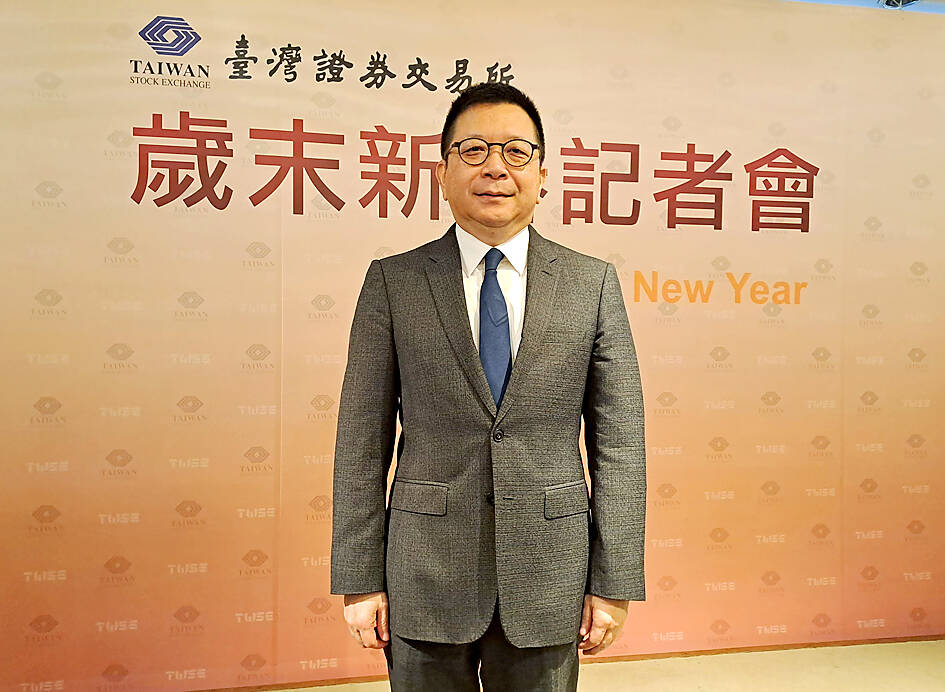The combined revenue of the 971 companies listed on the Taiwan Stock Exchange (TWSE) for the whole of last year totaled NT$40.2 trillion (US$1.32 trillion), up 5.34 percent year-on-year, the exchange said yesterday.
While last year’s total revenue hit a record high, the increase paled in comparison with the 15.19 percent rise the previous year, and analysts said that listed firms face growth headwinds this year amid a slump in market demand and ongoing inventory adjustments.
The exchange in a statement said that 553 firms reported revenue growth last year, while 418 reported a decline.

Photo: CNA
The oil, gas and electricity, semiconductor, and shipping and transportation industries reported the highest revenue increases of 33.98 percent, 20.09 percent and 18.91 percent respectively last year compared with 2021, the exchange said.
“Companies in the oil, electricity and gas industry benefited from an increase in product prices last year due to rising crude oil prices,” the statement said. “Firms in the semiconductor industry took advantage of higher market demand for 5G and automotive chips, while rising demand and freight rates lifted revenue in the shipping and transportation industry.”
Hon Hai Precision Industry Co (鴻海精密), the world’s largest contract electronics maker and a major supplier to Apple Inc, generated NT$6.62 trillion in revenue last year, to stay at the top of the sales rankings among listed firms in Taiwan.
Taiwan Semiconductor Manufacturing Co (台積電) ranked the second-highest with revenue of NT$2.26 trillion, followed by contract electronics manufacturers Pegatron Corp (和碩) with NT$1.31 trillion, Quanta Computer Inc (廣達) with NT$1.28 trillion and Compal Electronics Inc (仁寶) with NT$1.07 trillion, exchange data showed.
However, the financial and insurance, optoelectronics, and glass and ceramics industries underperformed due to unfavorable market trends, weakening demand and falling product prices, as their accumulated revenue dropped 31.47 percent, 18.98 percent and 14.39 percent from a year earlier respectively, the exchange said.
Last month, TWSE-listed firms saw combined revenue decrease 13.67 percent year-on-year to NT$3.28 trillion, as financial and insurance firms, shipping and transportation companies, and optoelectronics manufacturers reported relatively large revenue declines, offsetting increases in the food, tourism, and communications and networking industries, the exchange said.
Separately, the exchange aims to raise the number of initial public offerings (IPO) to 32 this year, including 10 for the Taiwan Innovation Board, after it lowers the threshold for investing in start-ups listed on the new trading board, TWSE chairman Sherman Lin (林修銘) told a news conference yesterday.
Last year, 23 companies debuted on the exchange, raising a record high NT$27.78 billion through IPOs, he said.
Total market capitalization of TWSE-listed firms reached NT$44.3 trillion last year, down from NT$56.28 billion in 2021, while daily securities turnover fell to NT$242.2 billion from NT$391.46 billion a year earlier, due to a greater volatility in the equity market.
Lin said that daily turnover this year would be about NT$220 billion.
The local equity market would likely perform better this year than last year, as Taiwan’s inflationary pressures are mild and the nation’s economy is expected to grow annually by more than 2.5 percent, he said, adding that the TAIEX averages a price-to-earning ratio of about 10, which is relatively low compared with most markets.

Meta Platforms Inc offered US$100 million bonuses to OpenAI employees in an unsuccessful bid to poach the ChatGPT maker’s talent and strengthen its own generative artificial intelligence (AI) teams, OpenAI CEO Sam Altman has said. Facebook’s parent company — a competitor of OpenAI — also offered “giant” annual salaries exceeding US$100 million to OpenAI staffers, Altman said in an interview on the Uncapped with Jack Altman podcast released on Tuesday. “It is crazy,” Sam Altman told his brother Jack in the interview. “I’m really happy that at least so far none of our best people have decided to take them

BYPASSING CHINA TARIFFS: In the first five months of this year, Foxconn sent US$4.4bn of iPhones to the US from India, compared with US$3.7bn in the whole of last year Nearly all the iPhones exported by Foxconn Technology Group (富士康科技集團) from India went to the US between March and last month, customs data showed, far above last year’s average of 50 percent and a clear sign of Apple Inc’s efforts to bypass high US tariffs imposed on China. The numbers, being reported by Reuters for the first time, show that Apple has realigned its India exports to almost exclusively serve the US market, when previously the devices were more widely distributed to nations including the Netherlands and the Czech Republic. During March to last month, Foxconn, known as Hon Hai Precision Industry

PLANS: MSI is also planning to upgrade its service center in the Netherlands Micro-Star International Co (MSI, 微星) yesterday said it plans to set up a server assembly line at its Poland service center this year at the earliest. The computer and peripherals manufacturer expects that the new server assembly line would shorten transportation times in shipments to European countries, a company spokesperson told the Taipei Times by telephone. MSI manufactures motherboards, graphics cards, notebook computers, servers, optical storage devices and communication devices. The company operates plants in Taiwan and China, and runs a global network of service centers. The company is also considering upgrading its service center in the Netherlands into a

Taiwan’s property market is entering a freeze, with mortgage activity across the nation’s six largest cities plummeting in the first quarter, H&B Realty Co (住商不動產) said yesterday, citing mounting pressure on housing demand amid tighter lending rules and regulatory curbs. Mortgage applications in Taipei, New Taipei City, Taoyuan, Taichung, Tainan and Kaohsiung totaled 28,078 from January to March, a sharp 36.3 percent decline from 44,082 in the same period last year, the nation’s largest real-estate brokerage by franchise said, citing data from the Joint Credit Information Center (JCIC, 聯徵中心). “The simultaneous decline across all six cities reflects just how drastically the market